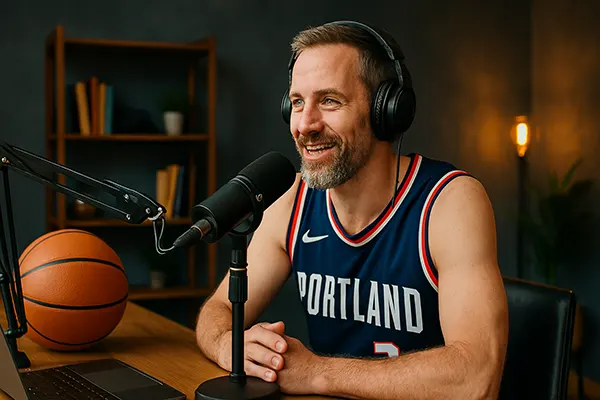The world of sports media is undergoing a major transformation. No longer solely reliant on traditional television or written journalism, athletes are taking control of their narratives through personal podcasts. These platforms provide fans with unfiltered access to athletes’ lives, opinions, and stories — a refreshing alternative to conventional coverage. With global reach and niche audiences, sports podcasts hosted by athletes are redefining how sports content is consumed in 2025.
The rise of athlete-led podcasts
Over the past few years, a significant number of professional athletes have embraced podcasting as a way to connect with fans and share authentic stories. This shift represents more than just a trend — it is a powerful move towards media independence, allowing athletes to bypass traditional intermediaries and speak directly to their audience. From in-depth interviews to light-hearted banter, these shows offer a unique glimpse into the minds of sports professionals.
One of the most notable examples is “The Old Man and the Three,” hosted by former NBA player JJ Redick. Known for its intelligent basketball talk and thoughtful guest appearances, the podcast has established itself as a go-to source for basketball enthusiasts. Redick’s experience as both a player and analyst lends credibility and depth to the content.
Similarly, “The Pivot,” hosted by former NFL players Channing Crowder, Fred Taylor, and Ryan Clark, explores themes beyond the field — tackling mental health, fatherhood, race, and resilience. Their honest and unscripted discussions have won over fans and built a loyal community that values authenticity over performance.
How podcasting empowers sports personalities
Podcasting has become a tool of empowerment for athletes, offering them creative control and a space to express views without filters. Unlike press conferences or social media, podcasts allow for long-form, nuanced discussions where topics are explored in depth. This has led to greater trust between podcasters and their audiences.
Take Draymond Green’s podcast, “The Draymond Green Show,” as a prime example. Broadcasting directly during his active NBA career, Green offers real-time insights into games, strategies, and locker room dynamics. This unprecedented level of transparency adds value for fans while showcasing the athlete’s media savvy and leadership skills.
For younger players, podcasting is also a means of brand building. They are no longer dependent on sponsorships or sports networks to amplify their voice. By hosting their own shows, athletes create intellectual property and forge a deeper emotional connection with their audience — turning listeners into loyal supporters.
Impact on sports journalism and fan culture
The rise of athlete-led podcasts is reshaping sports journalism. Traditional media outlets now often quote or reference these shows, acknowledging their influence. The dynamic has changed: athletes are not just subjects of journalism, but creators of it. This shift challenges journalists to adapt, elevating the quality of interviews and storytelling in mainstream coverage.
Fan culture is evolving alongside. Podcasts have cultivated communities that transcend club loyalties and geographical borders. Listeners feel part of an inner circle, gaining access to behind-the-scenes stories and emotional reflections rarely found in press statements. This intimacy drives engagement and strengthens fan loyalty.
Moreover, these podcasts provide space for underrepresented voices in sports. Whether it’s discussing mental health, systemic issues, or life after retirement, athletes are using their platforms to highlight topics that matter. As a result, fans gain a fuller understanding of sports as a cultural force, not just entertainment.
The changing role of the sports fan
Today’s sports fan is more informed and connected than ever before. Podcasts encourage active listening, critical thinking, and emotional investment. Instead of simply watching a match, fans now participate in broader conversations around strategy, identity, and personal growth.
Through athlete podcasts, fans also experience vulnerability and humanity. They hear about setbacks, self-doubt, triumphs, and lessons — which fosters empathy and admiration beyond athletic performance. The fan-athlete relationship becomes multidimensional and long-lasting.
These changes are especially relevant to younger generations who value transparency and storytelling. As digital natives, they are drawn to content that reflects real-life experiences and challenges traditional hierarchies. Podcasting, with its flexible format and direct tone, fits perfectly into this new paradigm of fandom.

What the future holds for athlete media
Looking ahead to 2025 and beyond, it’s clear that athlete-driven media will continue to expand. We are likely to see more sports stars launching their own production studios, exploring video podcasting, and collaborating across genres. The line between sports, entertainment, and education is already blurring — and podcasts are leading the charge.
With advancements in technology, including better audio tools and distribution platforms, podcasting is becoming more accessible. This democratisation allows not only elite athletes but also semi-professionals and retired players to share their voices. As a result, the sports media ecosystem will grow richer and more diverse.
Importantly, the rise of athlete podcasts underscores the value of lived experience in storytelling. These creators bring context, credibility, and charisma to their narratives — something that even the most skilled journalists may not fully replicate. By owning their stories, athletes are reshaping media on their own terms.
From trend to institution
What began as an experimental format is fast becoming an institution within sports media. Podcasts are not a passing fad — they are here to stay. In fact, many are expanding into multimedia ventures, with YouTube channels, live shows, and merchandise lines complementing their core audio content.
This movement reflects a broader cultural shift towards authenticity, self-expression, and autonomy. As society grows weary of overly curated content, the raw and real voices of athlete podcasters offer a welcome change. Their shows act as both cultural archives and ongoing dialogues about the human side of sport.
In the future, fans may look back at this era as the moment athletes became authors of their own stories — not just performers on the field but also influential voices behind the mic. And that is a victory worth celebrating.
